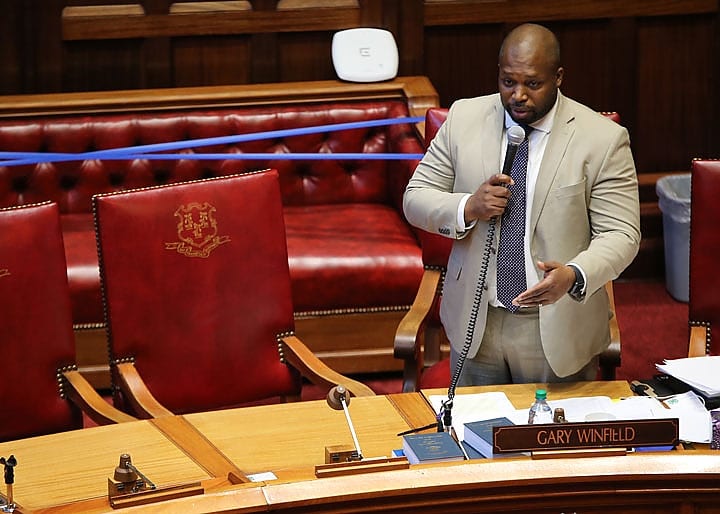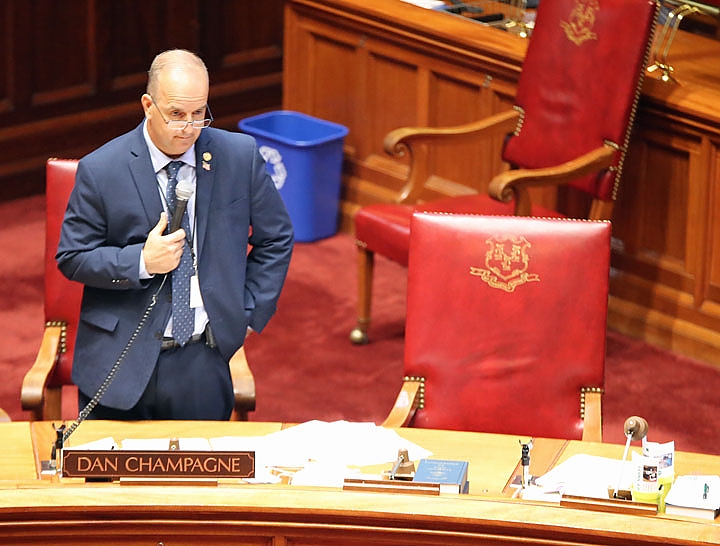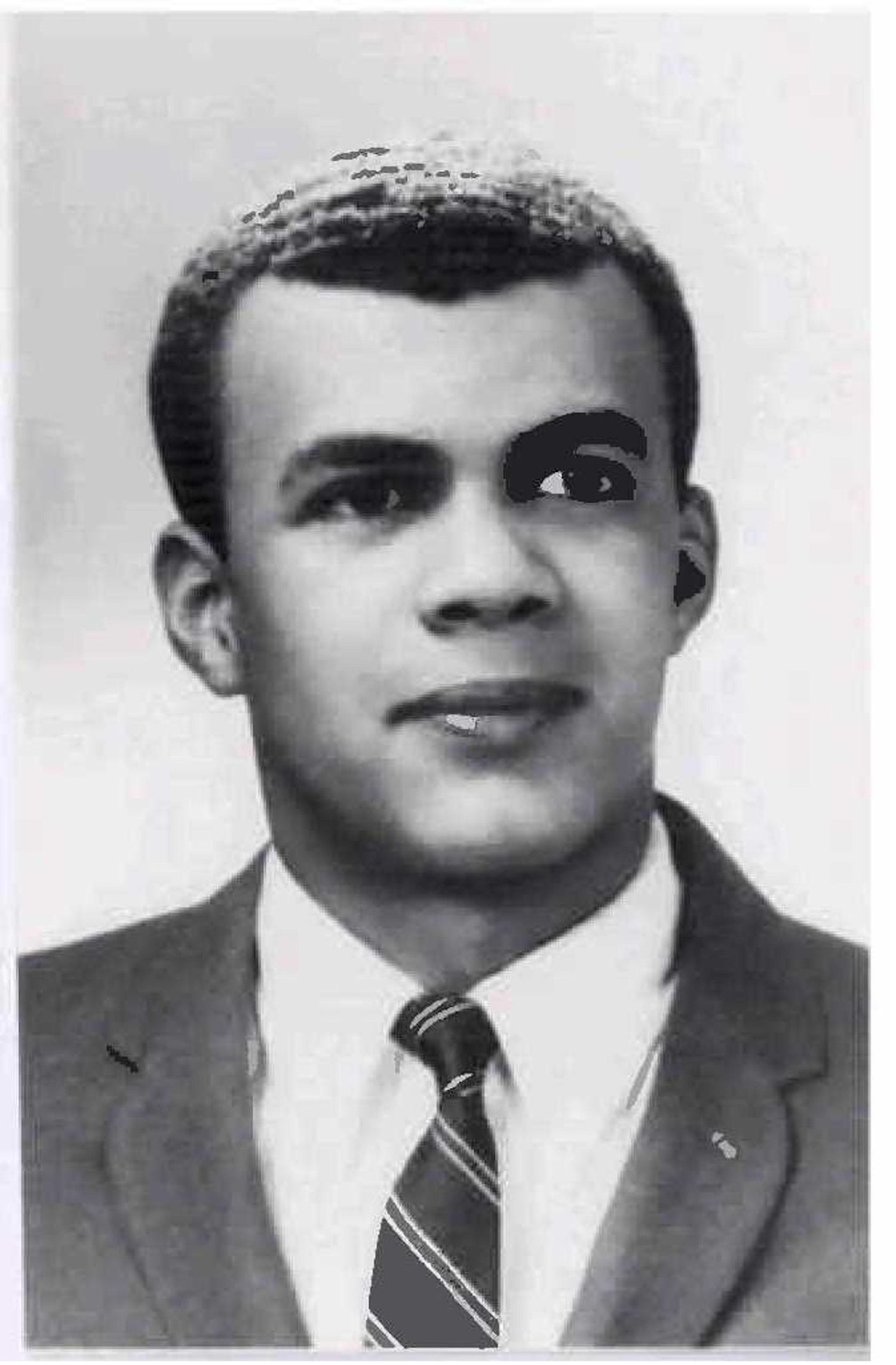Senate Sends Police Accountability Bill to Governor after Lengthy Debate

Audio By Carbonatix

Sen. Gary Winfield. Photo courtesy of Christine Stuart, CTNewsJunkie.com
In a special session that ended just before 4 a.m. Wednesday, the state Senate passed the police accountability bill approved by the House last week, and sent it to Gov. Ned Lamont for signature. State Sen. Derek Slap of West Hartford voted in favor of the measure.
By Christine Stuart, CTNewsJunkie.com
After a passionate debate about who the bill helps and who it hurts, the Senate gave final passage to a bill aimed at improving police accountability.
The bill passed 21-15 Wednesday morning after 10 hours of debate.
Some Senators were frustrated that they couldn’t change the bill because the House passed the bill last week and then adjourned the special session.
“I feel in some ways that we’re like a rubber stamp,” Sen. Steve Cassano, D-Manchester, said.
One of the sticking points of the bill, which caused outrage among police officers, was the qualified immunity portion. As the bill is written, municipalities would continue to cover the liability of police officers under most scenarios.
Only if an officer performed a “malicious, wanton or wilful act,” would they not be covered under municipal liability policies.
For Sen. Gary Winfield, D-New Haven, the legislation is about power.
“This is an issue about how power is used in communities,” Winfield said. “This is about how power is misused in community.”
He said the bill will help people in his community to get justice.
“This is about who the actor is when the system breaks down,” Winfield said. “And when the system breaks down, people still need the ability to find the recourse.”
He said the debate should be centered on those people who have been unable to get justice, not on law enforcement officers.
But not everyone saw the bill that way.
Sen. Dan Champagne, R-Vernon, who is a retired police officer, said this bill targets all officers, not just bad officers. He said police don’t understand this bill.

Sen. Dan Champagne. Photo courtesy of Christine Stuart, CTNewsJunkie.com
“Basically, nobody wants the bad policeman left in the police department. When it comes down to it, we have these laws put in place that are going to punish all officers – all good officers,” Champagne said.
He said this bill is making police officers all over the state “think this is politicians not backing them up and I agree with them,” Champagne said.
Then they should read the bill, according to Winfield.
Winfield said every lawmaker has a responsibility to read the bill and understand what the bill says before voting on it.
“Not what people feel it does. Not what people imagine it does. Not what people made up it does, but what it says,” Winfield said. “And that’s not what’s going on in this discussion.“
HB 6004 calls for training in the use of de-escalation, requires police to undergo regular drug and psychological testing, and adds provisions allowing the Police Officer Standards and Training Council to “decertify” officers accused of wrongdoing.
One key aspect of the bill creates an “inspector general’’ who would investigate deadly use of force and in-custody death incidents apart from the Chief State’s Attorney’s Office while administratively under the Division of Criminal Justice.
Under the bill, the Inspector General would investigate fatal use of deadly force incidents, non-fatal use of deadly force incidents, in-custody deaths at any police department in the state, and in-custody deaths for those who are being held by the state Department of Correction.
In 2019, 24 deadly use of force and in-custody deaths investigations were done by state and municipal police and the Department of Correction, according to Chief State’s Attorney Richard Colangelo. There were at least 19 similar investigations in 2018, he said.
Winfield said peoples’ “feelings about the bill” should not be taken into consideration. He said the discussion should be about the bill and not their “imagination.”
“I live in the district that I live in, others live in the district they live in. We have different realities but we all represent every single person in the state by extension of the fact that we sit here,” Winfield said. “The laws we make are for every single person in this state.”
He said when you take into consideration every person in this state, “You cannot say we don’t have a problem with policing.”
The people in Connecticut have not been taking to the streets for weeks just because of what happened in Minnesota to George Floyd, Winfield said.
Winfield pointed out that there have been protests in Suffield and Somers, which are places where these conversations don’t normally happen.
Sen. Eric Berthel, R-Watertown, said he believes the changes in the bill will weaken law enforcement in Connecticut.
“I think we will see good cops leave their profession and difficulty in the recruitment of new police officers,” Berthel said.
Sen. Norm Needleman, D-Essex, said he’s having a hard time “threading the needle” with this legislation.
Needleman, the first selectman of Essex, said there are clearly issues with the bill that he’s troubled by, but he doesn’t want to allow the “moment” to pass him by.
“My hearts goes out to the officers who put their lives on the line for us every single day,” Needleman said. “And yet in some communities they don’t feel that that’s the case. The police can be more of an impediment than a help.”
He said he appreciates that they have a moment and the bill did not go through the normal legislative process.
Needleman said he would support the bill “because I don’t think we can miss the moment.”
Republished with permission from CTNewsJunkie.com, all rights reserved.
Like what you see here? Click here to subscribe to We-Ha’s newsletter so you’ll always be in the know about what’s happening in West Hartford! Click the blue button below to become a supporter of We-Ha.com and our efforts to continue producing quality journalism.



